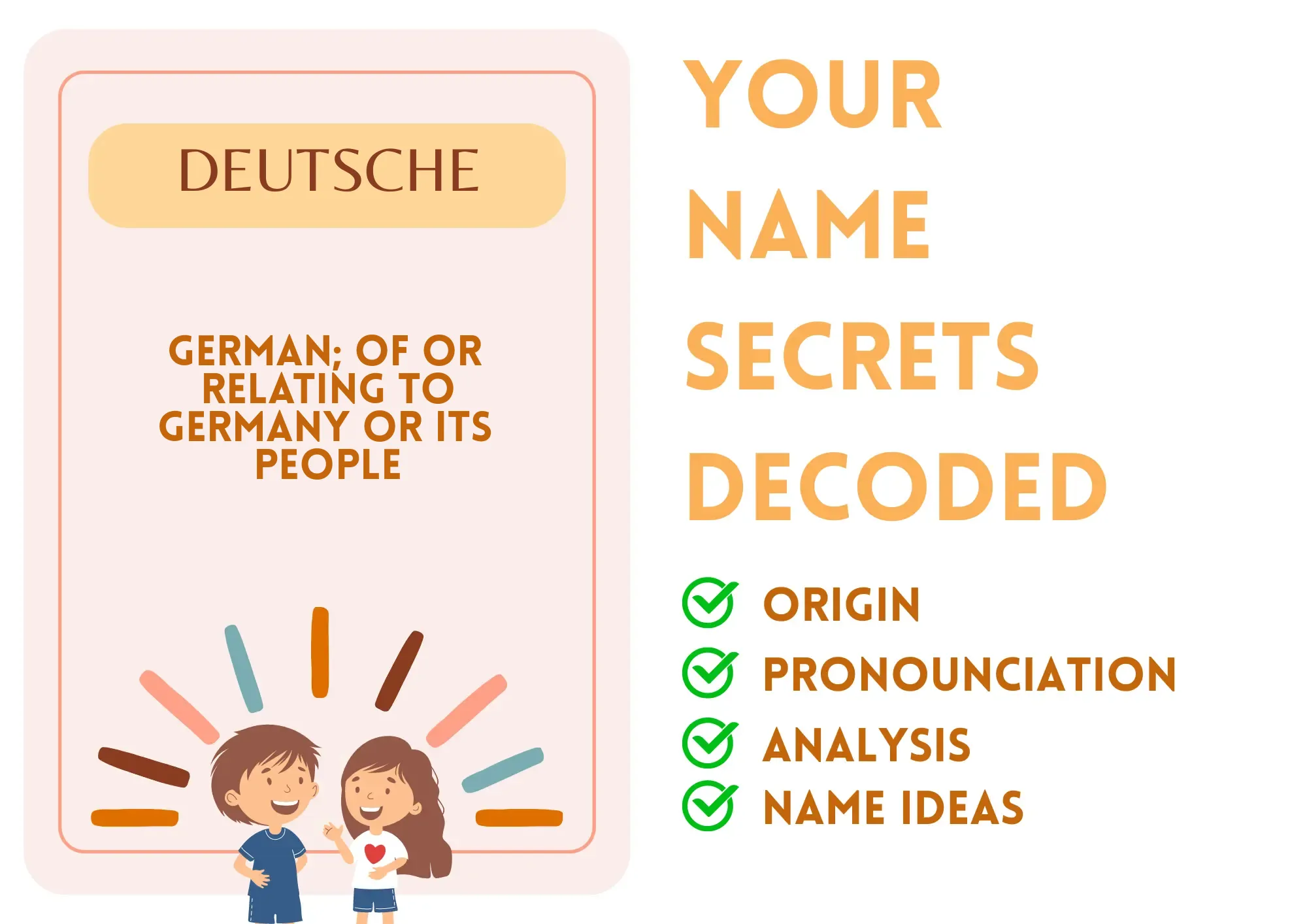
Deutsche
Deutsche is a name inspired by the German term for 'German' or 'the German people.' While not traditionally used as a personal name, it carries significant cultural and national identity implications. The term originates from the Old High German word 'diutisc,' which refers to the language and people of Germany. Although primarily a reference to ethnicity, it is appreciated by some for its uniqueness as a given name.
As a name, Deutsche evokes a sense of pride and connection to German heritage, symbolizing the essence of German culture, history, and language. It also reflects a modern tendency of parents to choose distinctive names that signify cultural roots.
Deutsche is perceived with intrigue and is associated with strength and character. It may be considered unconventional, leading to mixed responses depending on personal experiences and backgrounds. The name's phonetic simplicity aids in ease of writing and calling, while its distinctive sound makes it memorable.
Basic Information
Gender: Unisex
Sounds Like: DOYCH-uh
Pronunciation Explanation: The first syllable 'DOY' rhymes with 'boy', and the second syllable 'chuh' is pronounced lightly.
Summary and Meaning
Meaning: German; of or relating to Germany or its people
Origin: The name is derived from the Old High German word 'diutisc' which means 'of the people' and has evolved to represent the German identity.
Usage: While Deutsche is not traditionally a personal name, it can be used for both males and females, reflecting a modern, gender-neutral trend.
Name Number (Chaldean)
Name Number (Pythagorean)
Popularity (Global Rank)
Overall: 94409
Boys: 54235
Girls:
Most Popular in
Religious and Cultural Significance
Religion: N/A
Background: As a cultural term, Deutsche does not have direct religious connotations but is associated with a significant cultural identity.
Cultural Significance: The name embodies pride in German heritage and identity, often reflecting a connection to the language and traditions of Germany.
Historical Significance: Historically, the term Deutsche denotes the people of Germany and their culture, playing a crucial role in the formation of national identity, particularly during the 19th century in the context of German unity and nationalism.
Popular Culture
Literature and Mythology: While not featured prominently as a personal name in classical literature, references to 'deutsche' culture and identity are widespread.
Movies and Television: The term Deutsche is commonly used in films and television to refer to German characters or cultural contexts, showcasing aspects of German life.
Feelings and Perceptions
Perception: Deutsche can evoke a sense of pride and connection to German ancestry; however, its unconventional use as a personal name may lead to curiosity.
Positive Feelings: Unique, distinct, cultured, proud
Negative Feelings: Might be perceived as overly unconventional or too closely associated with a nationality rather than an individual identity.
Practical Considerations
Ease of Writing and Calling: Deutsche is relatively straightforward to write and pronounce, comprising eight letters and two syllables, though its unique nature may cause some hesitation.
Common Typos and Misspellings: Deutch,Dutsche,Dutshe,Deutshe
Common Nicknames: Dui,Dee,D
Deutsche Popularity
Deutsche Usage and Popularity By Country
| Country | Rank (Overall) |
|---|---|
| Lithuania | 3386 |
| Benin | 4287 |
| Germany | 5793 |
| Vietnam | 6237 |
| Paraguay | 6725 |
| Kazakhstan | 8176 |
| Honduras | 8354 |
| Albania | 10260 |
| Argentina | 15915 |
| Greece | 18504 |
Deutsche Usage and Popularity By City
| City | Rank (Overall) |
|---|---|
| Berlin | 6021 |
| Cologne | 3318 |
| New York | 39655 |
| Ulm | 836 |
Compatibility Analysis
Famous Persons Named Deutsche
No results found for Deutsche.
Related Names
Similar Sounding Names:
Dustin,Dora,Deanna